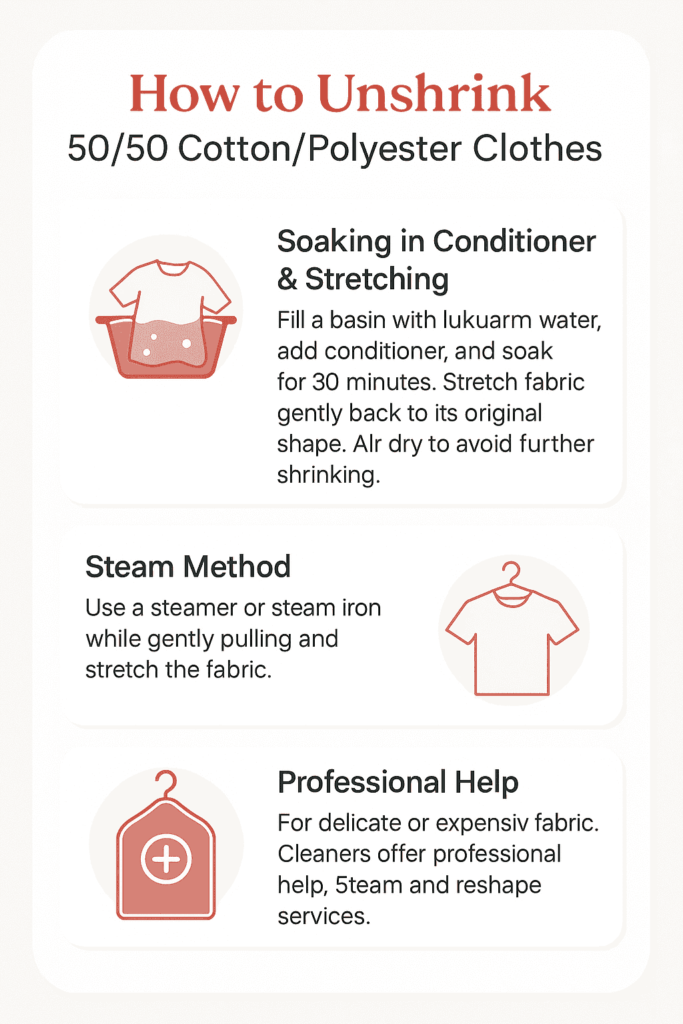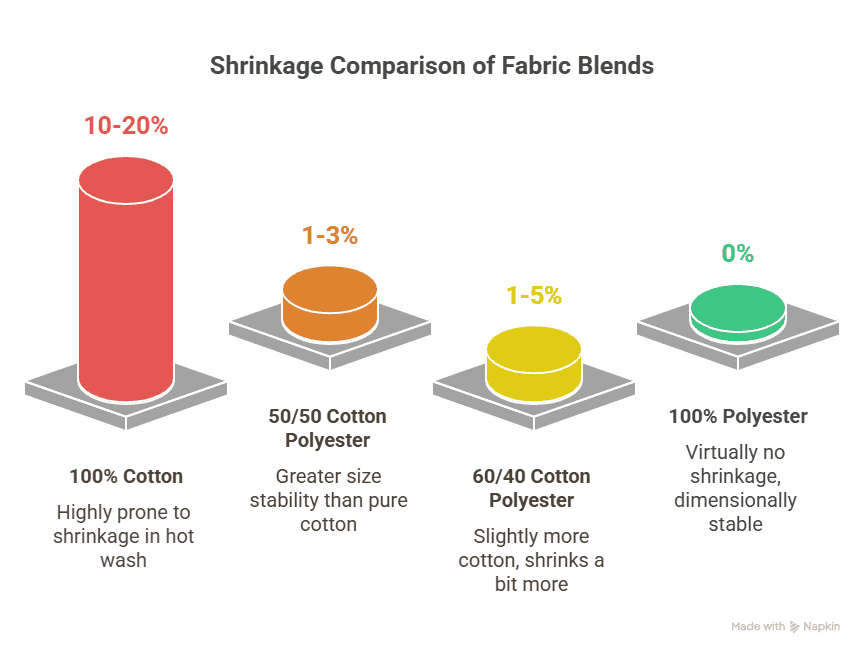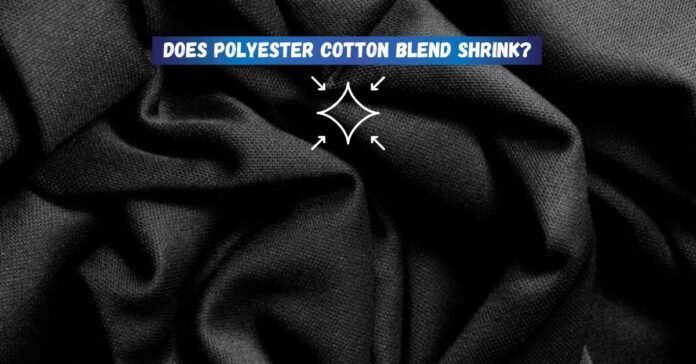Introduction
Laundry experts as well as consumers and retailers come across 50/50 garments quite frequently. Knowing how they react to washing is essential. This article looks into the shrinkage and care of 50% cotton and 50% polyester blends. We will answer the questions people ask the most, debunk widely accepted untruths, and provide instructions on washing, drying, and unshrinking these blends.
A 50% cotton 50% polyester blend is fabric made of equal parts cotton and polyester. The cotton gives the blend its softness and breathability while the polyester enhances its strength and wrinkle resistance. These blends are used in T-shirts, hoodies, uniforms, and other pieces of clothing that are worn regularly. Many manufacturers prefer 50/50 fabric blends because it offers the two fibers best features. The fabric is strong, tear-resistant, and durable for wear and washing. In this case, the important question is, does 50 % cotton 50 % polyester shrink? We answer this question next along with the reasons behind it and methods to reduce any potential shrinkage.
Does 50% Cotton 50% Polyester Shrink?
Yes, 50 50 cotton polyester will shrink, much less than 100 percent cotton shirting. Cotton fibers have a tendency of contracting either during washing or since it can be dried using excessive heat, but the polyester assists in maintaining the shape of the fabric. 50/50 will be reduced in size in practice by a small amount only (usually a few percent) compared to the huge reduction when using pure cotton.
Cotton Shrinks Due to Heat and Agitation
Cotton is a natural fabric that reduces greatly when subjected to heat. When cotton is washed or dried in high temperatures, the fibers would stiffen and the fabric would shrink. A typical example is that a cotton shirt does not shrink that much, especially when it is not prewashed, with an average size loss of 10 to 20 percent in a hot-wash load. Because a 50/50 fabric contains cotton, it will shrink some if exposed to hot water or a hot dryer. The cotton portion is what mainly drives any shrinkage.
Polyester Resists Shrinking but Can Be Affected by High Heat
Polyester is a synthetic fiber engineered to keep its shape. It does not shrink much under normal laundry conditions. Pure polyester garments often emerge from wash and dry at the same size. However, extreme heat (like very hot drying or ironing) can still cause polyester fibers to loosen or slightly deform. In a 50/50 blend, the polyester helps stabilize the fabric, so overall shrinkage remains minimal. In short, polyester resists shrink, whereas cotton actively shrinks, so the blend only shrinks a little.
Comparing Shrinkage Rates (Example: 3–5% vs. 10%)
To put it in perspective, 100% cotton often shrinks on the order of 10–20% in a hot wash. By contrast, a 50/50 blend typically shrinks only a few percent under the same conditions. In practical terms, a cotton shirt that was 40 inches around might shrink to about 36 inches, while a similar 50/50 shirt might only shrink to about 39 inches. In other words, expect roughly 1/3 or less the shrinkage in a 50/50 blend compared to pure cotton. One source notes that 50/50 shirts shrink roughly 1–3%, compared to very high rates for cotton. (Some estimates suggest cotton could shrink nearly 10% or more on first wash.)
Factors Affecting Shrinkage
Several factors influence how much a 50/50 garment will actually shrink:
Washing & Drying Methods
Laundry settings have a major impact on shrinkage. High heat and rough handling drive shrinkage. Machine washing in hot water or tumble drying on high heat causes the most shrink. Conversely, washing in cold water and using a low-heat or air-dry setting will greatly reduce shrink. Even an extra-long spin or drying cycle can tighten fibers. In practice, experts advise: avoid hot washes and high dryer heat to keep blended fabrics size-stable.
Fabric Quality
The quality and manufacturing of the fabric also matter. Higher-quality 50/50 blends often receive treatments that limit shrinkage. For example, many are pre-shrunk during production or given chemical finishes to reduce fiber swelling. A well-made 50/50 cloth might shrink almost nothing in normal wash. Inexpensive or low-end blends may lack these protections, so they can shrink a bit more. In summary, better-quality blends are engineered to hold their size, while cheaper blends might “wink” in the wash if treated harshly.
Pre-Shrunk vs. Non-Pre-Shrunk Fabric
Some garments are labeled “pre-shrunk.” This means the cotton has already been shrunk during manufacturing. A pre-shrunk 50/50 item will typically shrink very little (often under 5%) because most of the cotton’s contraction has already occurred. In contrast, an un-pre-shrunk blend can shrink more on the first wash. For example, unsanforized (non pre-shrunk) cotton may lose up to ~20% after one hot wash, whereas pre-shrunk fabric usually loses only around 5%. Always check the label: if it says pre-shrunk, you can expect minimal additional shrinkage in home laundry.
How to Prevent Shrinkage
Follow these best practices to minimize shrinkage in 50/50 fabrics:
Wash in Cold Water
Always wash 50/50 fabrics in cold or cool water. Cold water keeps cotton fibers from tightening. Most care labels recommend cold washing for blends. By contrast, hot water will speed up shrinkage, so avoid hot wash cycles entirely. Using cold water is the single most effective way to prevent the cotton in the blend from shrinking.
Use Gentle Cycle or Hand Wash
Select a gentle or delicate wash cycle. These cycles use slower agitation and spinning, which is easier on the fibers. If possible, hand wash the garment in lukewarm water with a mild detergent. Hand washing completely avoids the machine’s vigorous tumbling. Keeping the agitation gentle prevents fibers from matting and shrinking. (In any case, stick to low water temperatures even when hand washing.)
Air Dry or Use Low-Heat Drying
Heat from dryers is the other major culprit. The best method is to air dry the garment by hanging it up or laying it flat. If you must use a dryer, set it to low heat (often called “delicate” or “tumble low”). Remove the item promptly when it is dry or even slightly damp. Over-drying or using medium/high heat can cause the cotton fibers to shrink more. Industry experts note that avoiding high dryer heat is key to keeping cotton blends true to size.
Avoid Ironing at High Temperatures
Ironing with high heat can also shrink the cotton portion. If ironing is needed, use a low-temperature setting (often labeled “polyester” or “permanent press”) and use the iron’s steam function if available. Avoid holding the iron too long on any spot. High-heat ironing (like the cotton setting) can tighten fibers and cause shrinkage. In general, treat the garment gently on the iron, just enough to remove wrinkles without excessive heat.
How to Unshrink 50/50 Cotton/Polyester Clothes
If a 50/50 item does shrink, there are ways to gently stretch it back:

Soaking in Conditioner & Stretching
One common home remedy is to soak the shrunken garment in lukewarm water with a small amount of hair conditioner or gentle fabric conditioner. The conditioner helps relax the fibers. Soak for about 20–30 minutes. Then lay the damp garment flat on a towel and gently stretch it back to its original dimensions. Pin or smooth it out as it dries. This loosens the fibers so they won’t snap back as tightly, allowing you to coax the fabric back to size.
Steam Method (Steamer or Iron)
If the fabric allows, use steam to relax the fibers. Hold a garment steamer or a steam iron (set on low/no direct contact) a few inches above the cloth and steam the shrunken areas. While steaming, gently pull on the material to stretch it out. The combination of heat and moisture loosens the fibers. Move the steamer or iron slowly over the tight spots and use your hands to reshape the fabric. This can help lengthen a slightly shrunken shirt or other garment.
Professional Stretching at a Dry Cleaner
For valuable or very stubborn items, consider professional help. Some dry cleaners and tailors offer garment blocking or stretching services. They use steam cabinets and pinning techniques to reshape clothes. For example, a cleaner might pin the damp garment onto a frame in the correct size and then apply steam. After drying, the fabric maintains the new dimensions. These professional methods can restore several inches of length if done correctly, which is especially useful for expensive or delicate items.
Comparison with Other Fabric Blends
Putting 50/50 shrinkage in context with other blends:

50/50 vs. 100% Cotton (More Shrinkage)
A 100% cotton garment is much more prone to shrinkage. An untreated cotton shirt could shrink by 10–20% in a hot wash. In contrast, a 50/50 shirt of the same starting dimensions typically only shrinks around 1–3% under the same conditions. In other words, pure cotton may tighten noticeably after laundry, whereas 50/50 fabric will remain much closer to its original size. Thus, 50/50 blends provide far greater size stability in the wash than 100% cotton.
50/50 vs. 60% Cotton 40% Polyester
A 60/40 cotton-poly blend (often called “CVC”) has slightly more cotton than 50/50, so it will shrink a bit more. Most sources say a 60/40 shirt can shrink on the order of 1–5% when washed hot. A 50/50 shirt usually shrinks at the low end of that range. In practice, both blends behave similarly: if washed gently, neither will change much. The difference is subtle – 60/40 might shrink marginally more under extreme conditions, but with normal care the two blends perform almost the same.
50/50 vs. 100% Polyester (Minimal Shrinkage)
A 100% polyester garment shrinks almost not at all. Polyester fibers are dimensionally stable, so a polyester shirt will hold its fit even after hot washing. By comparison, a 50/50 shirt still has cotton, so it will shrink a little (because of the cotton content). In short: polyester = virtually no shrinkage; 50/50 = just a tiny shrink; cotton = a lot of shrink. If absolute zero shrink is the goal, 100% polyester is best. A 50/50 blend offers more comfort and breathability, with only minimal extra shrink in return.
50/50 Cotton Polyester Blend Shrinkage
In summary, 50/50 blends do shrink, but very little if you follow proper care. The polyester component greatly limits how much the cotton fibers can contract. In a standard, gentle home wash, you might not notice any size change at all. Even if you did a very hot wash and dry, you would typically see only about 2–3% shrinkage. For example, a garment that was 40 inches around might come out about 38.8 inches – a subtle change. Most of the time, this small shrinkage is barely noticeable, so the shirt will still fit fine. Unlike pure cotton, a 50/50 garment retains its shape well, as long as you avoid extreme heat.
How to Wash 50 Cotton 50 Polyester
In order to wash a 50/50 garment, safely:
- Cold Water: Whenever we wash, it should be in cold or cool water. Cotton shrinks with hot water, therefore it should not be used.
- Gentle Cycle: Place gentle or permanent press cycle in the machine. This reduces agitation and assists in maintaining size.
- Soft Detergent: Use a mild laundry soap and not bleach or abrasive chemicals which may weaken the fiber.
- Sort Laundry: You should wash like fabrics together and not to overload. Mix the cotton blends with heavy fabrics.
By following these steps and sorting laundry properly, you treat the fabric very gently. For example, experts recommend grouping similar materials together and using delicate settings for blends. If hand-washing, use cool water and mild soap and you’ll minimize any shrink entirely.
Best Way to Dry 50/50 Cotton Polyester Blend
Dry 50/50 fabrics carefully to avoid heat shrink:
- Air Dry: Hanging or flat air-drying is the safest way to dry. It uses no heat.
- Low-Heat Drying: If you use a dryer, select the lowest heat setting. Some machines have an “air only” or “delicate” cycle.
- Prompt Removal: Take the item out of the dryer as soon as it is dry or slightly damp. Don’t leave it running once dry.
- Avoid Over-Drying: Do not use a medium or high heat cycle to “finish drying.” Excess heat in the dryer will shrink the cotton part of the blend.
In short, treat the dryer like a risk: minimize heat and time. Many care guides stress that low or no heat is essential for drying cotton/poly blends. If you air-dry and reshape the garment, it will maintain its intended size.
Common Myths About 50/50 Blends & Shrinkage
“It Doesn’t Shrink at All” – False
While polyester resists shrinking, the cotton component still reacts to heat and movement. It may not shrink much, but it isn’t shrink-proof.
“All Polyester Blends Behave the Same” – Not True
Blends vary. A 60/40 behaves differently than a 50/50. The more polyester a fabric has, the less it shrinks.
Conclusion-
In conclusion, a 50% cotton and 50% polyester blend fabric will shrink a little, but very little if you use proper care. It is far more stable than pure cotton. The best practice is to wash in cold water, use a gentle cycle, and dry on low heat or air dry. Avoid extreme heat in both washing and ironing. Finally, always check the garment’s care label. The label lists the fiber content and recommended instructions; if it says “pre-shrunk,” you have extra protection. By following the label and these tips, a 50/50 garment should retain its fit through many washes. Cold washing and gentle drying let you enjoy the comfort of cotton and durability of polyester without significant shrinkage. I hope your question “Does 50 cotton 50 polyester blend shrink? has solved.”
Read More>> About the shrinkage of cotton and linen fabric.
FAQs
Oddly enough, it can shrink a little, but only in the event that the material is not pre-shrunk. To reduce this, use coldwater.
Yes, but only in low-heat. When the heat is high, there will be increased risks of shrinkage.
It helps to pre-wash so that later there is the least chance of being aware of the shrinkage. The best results are always attained when using care labels.
